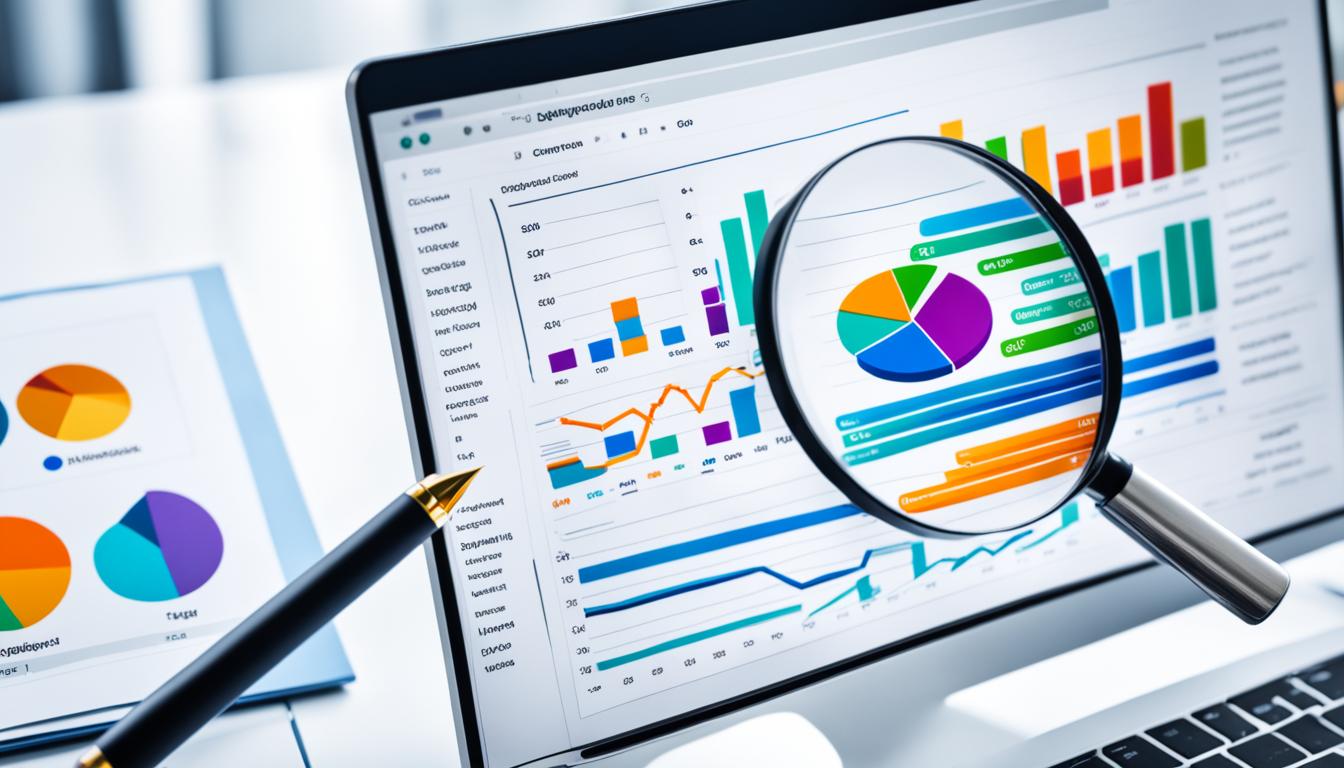
Welcome to the realm of SEO analytics, where unseen insights are vital for top performance on Google's Knowledge Graph. We'll explore the basics here, showing how SEO analytics can transform your online presence. By analyzing data and using smart optimizing methods, you can boost your site's visibility and growth.
Content optimization is a key aspect of SEO analytics. By adjusting your site's content to meet SEO standards, you up your odds of showing up in search results. This will help you pull in more visitors. It's all about using the right keywords, tweaking meta descriptions, and making sure your content is both handy and interesting.
The Google Knowledge Graph is always getting smarter, making knowledge of SEO analytics more important. If you can untangle its secrets, you could surpass your rivals and make the most of your website's capabilities.
Key Takeaways:
- SEO analytics uncovers wisdom to better your performance on the Google Knowledge Graph.
- Enhancing your content is vital for being more visible and attracting a larger crowd.
- Because the Google Knowledge Graph keeps getting better, knowing SEO analytics deeply is crucial to leading the way.
Understanding the Power of Keywords in SEO Analytics
In SEO analytics, keywords work like magic keys. They unlock your site's potential. The right words connect your content with people online. This helps search engines rank your site well.
Keyword research is key in SEO analytics. It's about finding what words your customers use. Knowing these helps you make content that fits their needs. This boosts how often you appear in search results.
When looking for keywords, think about their meaning and how often they're searched. Make sure they match what your audience is looking for. Also, find a balance between these to do well in SEO.
Using keywords in your content is crucial. Place them naturally in titles, headings, and text. This shows search engines your content is helpful. But, never overuse keywords. This could hurt how your site ranks.
"Keywords are the fuel that powers your SEO analytics, propelling your website to the top of search engine results." – John Mueller
The Art of Staying Ahead in the Search Landscape
Staying ahead in search is tough but vital. Always work on your keyword use. Keep an eye on what's trending. By updating your content, you'll keep attracting visitors.
Check your keyword strategy often. Make sure it still matches what your audience likes. Tools like Google Trends and SEMrush help with this. They show what keywords are popular and what the competition is like.
Don't forget about longer keywords. They're more specific and can tell you a lot about what users want. Even though they're not searched as much, they often bring more interested visitors.
| Benefits of Keyword Research for SEO Analytics | Challenges |
|---|---|
| Enhanced visibility in search results | Identifying the most relevant keywords |
| Increased organic traffic | Balancing search volume and relevance |
| Higher click-through rates | Avoiding keyword stuffing |
| Improved search engine rankings | Adapting to evolving preferences |
Knowing how to pick and use keywords is a big win. It helps your SEO work at its best. The right keywords draw people to your site. This makes you more visible and stands out online.

On-Page Optimization Tactics for SEO Content
When tackling SEO, focusing on on-page optimization is key to boosting where Google ranks your website. With the right tactics, you can make sure your site is seen more. This will drive more visitors naturally.
Crafting Compelling Meta Descriptions and Title Tags
Meta descriptions and title tags are vital for your site. They give search engines clues about what your page is about. Make sure your descriptions are short and catchy. Use keywords naturally to help people find your site while keeping it readable.
"A well-crafted meta description can entice users to click through to your website and boost your organic search visibility."
For title tags, don’t forget to include important keywords. This reflects what your page is about. Keep them brief to catch the eye. Adding your brand name here can also boost your online presence.

Optimizing Images for Enhanced Visibility
Images are great for attracting and keeping users on your site. It's crucial to optimize them. Remember to make images smaller without losing quality to speed up your site. Give them clear names and add ALT text with keywords. This will help boost your site’s image in search results.
Ensuring a Mobile-Friendly User Experience
Nowadays, focusing on mobile users is more important than ever. Your site must look good and work well on mobile. How your site does on mobile affects your search rankings a lot. Make sure your site is easy to use on any screen size. Use Google's Mobile-Friendly Test to spot and fix any mobile issues.
Creating Engaging and Relevant Content
On-page optimization pairs well with great content. Your content should be interesting and meet your audience's needs. Use keywords naturally and avoid stuffing them in. Good content keeps visitors longer and improves your site’s search rank.
Mastering Off-Page SEO for Enhanced Visibility
In this section, you'll learn how to improve your website's visibility. Off-page SEO is key for boosting your site's authority and bringing in natural visitors. By working on your backlinks and using guest posts well, you can make your website more visible on Google.
The Importance of Building a Robust Backlink Profile
Building a strong backlink profile is vital for off-page SEO. Backlinks are links to your site from others, showing your content's trustworthiness to search engines. A mix of high-quality backlinks can notably improve your site's visibility and rank.
To do this, seek links from respected and relevant sources. Work with influencers, blogs, and similar sites to get valuable links. Also, focus on creating content that other sites will naturally link to because it's helpful and fitting.
Exploring Ethical Link-Building Strategies
When it comes to backlinks, using ethical strategies is important for the long run. Avoid shady practices like buying links, as they can damage your site's standing with search engines. Instead, aim for organic methods.
This includes making content that people want to share, reaching out to related sites, and using your connections. By offering something valuable, you're likely to get links in a natural, ethical way.
The Significance of Guest Posting
Guest posting on niche-related sites is a great way to get your name out there. It lets you share what you know with more people and get links back to your site. Focus on quality content that fits well with the website you're posting on.
When picking sites to guest post on, aim for those well-regarded and similar to your niche. By adding something useful to these sites, you can draw in their visitors to your own site. This method is not just for backlinks; it's also about showing your expertise and building trust.
Harnessing the Power of SEO Analytics and Data Interpretation
Being a smart marketer or website owner, you know how vital SEO analytics are for Google Knowledge Graph success. But gathering data isn't the end of it. To truly benefit from SEO analytics, you need to make sense of the data and find insights you can act upon.
First, pick the right analytics tools to dive into SEO data. You can choose from Google Analytics, SEMrush, Moz, and more. Opt for a tool that meets your goals, giving detailed data on things like organic traffic, keyword rankings, and user actions.
Next, understand the data to get meaningful insights. Look closely at your organic metrics, such as keyword rankings and trends in organic traffic. Find any consistent patterns or oddities. These can show you where to make changes or where you're doing well.
For example, a sudden dip in organic traffic could point to a technical problem or a search algorithm change. Investigating and making the right fixes can help you regain visibility. This will boost your site's overall performance.
Watching user behavior, like bounce rates and time spent on pages, offers clues about your content's quality. A high bounce rate or short time on pages suggests your content might not be grabbing your visitors' interest. This hints that optimizing or targeting your content better could help.
Keep in mind, SEO analytics is about more than looking at numbers. It's turning insights into actions. Use what you learn to tweak your SEO approaches. This can enhance how well your site does on the Google Knowledge Graph.
Key Takeaways:
- Harnessing the power of SEO analytics involves effectively interpreting data to uncover valuable insights.
- Select the right analytics tools that provide comprehensive data on performance metrics.
- Analyze organic performance metrics to identify patterns or anomalies that indicate areas for improvement.
- Track user behavior metrics to assess the quality and relevance of your content.
- Take action based on the insights gained from data interpretation to optimize your SEO strategies.
In the next section, we will explore advanced performance metrics and how they can be leveraged to drive success on the Google Knowledge Graph.
Conclusion
SEO analytics are key in improving your presence on the Google Knowledge Graph. I've learned that knowing SEO basics, picking the right keywords, and using on-page and off-page strategies help a ton. With this knowledge, I can boost my content's visibility and performance.
Thanks to SEO analytics, I can keep polishing my digital strategies. This helps my website compete better and be seen by more people. The Google Knowledge Graph offers a big chance for my content. By refining my SEO, I make sure it shows up in important searches.
SEO analytics let me keep an eye on my website's success and find ways to do better. I use what I learn to make smart choices, staying one step ahead. This, combined with the Google Knowledge Graph, is my way to shine online and keep growing.
FAQ
What is SEO analytics and why is it important?
SEO analytics is all about looking at data to see how well your site does on search engines. By doing this, you can find out what's working and what needs to be better. It's key to track how easy it is to find your site, the traffic it gets, how it ranks with certain words, and more. This info helps you change and make better choices to get your site out there more.
How does SEO content optimization impact visibility and growth?
When you make your website's content better for search engines, more people may find it. This means using the right words, making interesting content, and adjusting how it's set up. Better online visibility means more people visiting your site. And this, in turn, can help your business grow by attracting new customers online.
How can I identify the right keywords for my target audience?
To find the right keywords, you must do keyword research. Think up topics related to your business. Then, use tools like Google Keyword Planner, SEMrush, or Moz Explorer to find more keywords. The key is to pick words that many people search for but few others use. See what keywords your competition uses too to get more ideas.
What are some on-page optimization tactics for SEO content?
On-page tactics are actions you take right on your site to boost its search engine showings. Start by making every page have a unique, catchy title and meta description. Also, use important keywords in titles and headings and throughout the content naturally. Don't forget to describe your images well and make sure your site works great on phones. And make it load fast. All these steps help search engines understand and like your site more, possibly moving it up in search results.
How can off-page SEO techniques enhance visibility?
Off-page SEO is about things you do away from your site that can make it more well-known and respected. Getting backlinks from other trustworthy websites is a big step. Also, writing for respected websites in your field can boost your credibility and bring more visitors to your own site. By working on these tactics, you might see your site appear higher in search results.
How can I effectively interpret SEO analytics data?
Start by picking out what matters most for your site's success, like how much content people see, your keyword ranks, or if visitors are sticking around. Use tools like Google Analytics and others to watch this data. Look for trends and clues in the numbers to see what to keep doing and what to change. These findings can guide you in making smarter SEO choices and enhance your site's performance.











